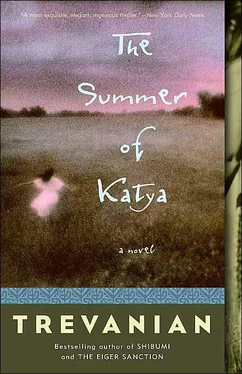Rodney Whitaker - The Summer of Katya
Здесь есть возможность читать онлайн «Rodney Whitaker - The Summer of Katya» весь текст электронной книги совершенно бесплатно (целиком полную версию без сокращений). В некоторых случаях можно слушать аудио, скачать через торрент в формате fb2 и присутствует краткое содержание. Город: New York, ISBN: , Издательство: Crown Publishing Group, Жанр: Триллер, Современные любовные романы, на английском языке. Описание произведения, (предисловие) а так же отзывы посетителей доступны на портале библиотеки ЛибКат.
- Название:The Summer of Katya
- Автор:
- Издательство:Crown Publishing Group
- Жанр:
- Год:неизвестен
- Город:New York
- ISBN:1400098041
- Рейтинг книги:4 / 5. Голосов: 1
-
Избранное:Добавить в избранное
- Отзывы:
-
Ваша оценка:
- 80
- 1
- 2
- 3
- 4
- 5
The Summer of Katya: краткое содержание, описание и аннотация
Предлагаем к чтению аннотацию, описание, краткое содержание или предисловие (зависит от того, что написал сам автор книги «The Summer of Katya»). Если вы не нашли необходимую информацию о книге — напишите в комментариях, мы постараемся отыскать её.
The Summer of Katya — читать онлайн бесплатно полную книгу (весь текст) целиком
Ниже представлен текст книги, разбитый по страницам. Система сохранения места последней прочитанной страницы, позволяет с удобством читать онлайн бесплатно книгу «The Summer of Katya», без необходимости каждый раз заново искать на чём Вы остановились. Поставьте закладку, и сможете в любой момент перейти на страницу, на которой закончили чтение.
Интервал:
Закладка:
“You’ve done well, Montjean. I am sure Father hasn’t the slightest hint that your interest in us is not solely medical. That bespeaks an admirable streak of duplicity in your nature. You really should cultivate this gift, not only as a means of surviving in a world of rogues and merchants, but as leavening in a personality that is altogether too serious and sincere to be interesting.”
“Are you always this uncivil, Treville?”
“Not always. You bring out the best in me.”
“I’m delighted to be of service. May I wish you a goodnight?”
“Please do.”
Before the trap had reached the end of the poplar lane, the rain stopped, and as the mare walked comfortably back to Salies through the night air rinsed clean of dust, I troubled over several events of the evening. There was that strange, tense conversation I had overheard between Katya and Paul. And there was Paul’s warning that his father must know nothing of my interest in Katya while, so far as I could judge, the old man was a gentle pedant with no harm in him. Perhaps most troubling of all was the fact that I rather liked Paul Treville, although I had every reason not to. Was it his physical resemblance to Katya that drew me to forgive his adolescent discourteousness? I didn’t think so. Not that alone, anyway. There was a kind of desperate melancholy in the man, not quite concealed by his waspish wit, that made me sympathize with a person of lucid if brittle intelligence who had no outlet for his energies and mind in our rural corner of the Basque country.
Why did he accept this self-imposed isolation from the world he was born to, the world in which his gifts and talents were valued? Why, indeed, were the Trevilles living in an ancient heap of stone so far from their Paris? Katya had made an allusion to their being here for their health, but I could see no evidence of ill-health, and I could see every evidence, in Monsieur Treville’s eagerness to share ideas and concepts with me, of a hunger for the civilized society they had left.
In a selfish way, of course, I was delighted that they were here in Salies. How else would I ever have met Katya?
Katya… And the rest of my ride into town was occupied with fabricating little scenes and swatches of dialogue between Katya and me.
Directly the clinic closed at three the next afternoon, I borrowed Doctor Gros’s trap again and rode out to Etcheverria, arriving in time for tea, which was taken on the terrace overlooking the derelict garden. Paul’s attitude had changed totally; he was full of light chat and jokes that had no trace of vitriol in them. And when Monsieur Treville joined us from his study, Paul asked him about his work with every evidence of genuine interest and concern, which was a far cry from the tone of impish baiting that had colored his conversation the night before.
At first, Monsieur Treville seemed confused to see me at their tea table, and there was an uncomfortable moment when I was afraid he didn’t recognize me and hadn’t the slightest idea who I was. But Katya used my title several times until, with a little start of comprehension, her father said, “Ah, yes! You’re the fellow who’s deeply involved in studies of the Black Death, aren’t you? Yes. Fascinating subject. Fascinating.”
Paul excused himself after only one cup of the thin tisane Katya served, claiming that there were a thousand things demanding his attention, so he had best take a little nap and give them a chance to solve themselves under the influence of his benign neglect. Monsieur Treville rose and pled the demands of scholarship, shaking my hand in farewell and cautioning me not to devote myself overly much to my study of medieval medicine, as I was a young man and must not allow life to pass me by.
Katya smiled after her departing father and shook her head affectionately. “He likes you, Jean-Marc Montjean.”
“I like him, too.”
She looked at me, her grey eyes soft and smiling. “Yes, I know. And that pleases me. But you may have to bone up a little on things medieval.”
“I shall make it my constant study.”
She laughed lightly and rose. “Shall we stroll down to my library?”
“You speak of the library that disguises itself so cleverly as a half-ruined summerhouse?”
“What other library have I? Come along.”
And for the better part of two hours we chatted, she sitting in the battered wicker chair that was the gazebo’s only furnishing or perched upon the balustrade rail, while I sat on the steps or leaned against the frame of the latticed arch entrance. Our conversation ranged freely, shallow and deep, now and ago, serious and light-hearted, personal and global, the topic pivoting on a word or branching off in a new direction under the impulse of a non sequitur image or idea that appeared in one of our minds or the other. Time acted in a most paradoxical way: on the one hand, it was suspended and frozen, on the other it fled like water through our fingers.
I accepted her invitation to return for tea the next day, when again we chatted about everything and nothing. And so it was the following day, and the day after that. In my memory, all the hours we passed in the summerhouse blend together as a prolonged, but all-too-brief, time spent sitting in the dappled light, concealed in the overgrown garden, while above the trees the sky was always an ardent blue and the air was always cool and gently moving in the perfect weather of that July.
We came to using first names. We came to sharing long silences without that sense of social embarrassment that strangers have. I fell into the habit of groaning at her puns, even though some of them were admirable tricks of sound and sense requiring a considerable exercise of literary or political allusion. She came to teasing me for being typically Basque in my unlikely combination of dour earnestness and theatrical romanticism.
I was particularly fascinated by an ambivalence of mood that was so especially Katya’s. Most of the time, she was vividly alive and alert to everything around her: she pointed out birds in branches that I could not discover even when she directed my gaze to the spot; she took pleasure in the close examination of the form and structure of the petals and leaves of such flowers as had survived the long neglect the garden had suffered; she delighted in the feel of the sun on her face and the smell of the heated summer air; she loved to play with words and ideas, twisting and re-forming them with her particular sense of the ridiculous. But at other moments—rather rarely—she would suddenly retire within herself, sometimes in midsentence, and I could tell from the vague and distant look in her eyes that she was elsewhere, not in this garden, not in this world… not with me. She would gaze in silence across the garden, alone and serene in her thoughts, then there would be a slight flicker in her eyes and she would glance at me, and I knew she had returned from her reverie.
She would joke about it, saying something like, “Well, I’m back. Were there any letters for me while I was away?”
And I would say something like, “No, but there was a telegram from your brother. It seems his grandson is getting married next month.”
“Oh, really?” she would laugh. “Have I been gone all that long?”
“Very long. Nearly a minute. And very far away. Nearly beyond my reach.”
Fragments of the things we talked about during those delicious afternoon hours return to me even now, fresh and whole, like those snatches of melody from one’s youth that slip back unsolicited from the hidden reaches of the memory. Often we exchanged moments and incidents from our childhoods, shards of ourselves shared unselfconsciously, and not so much shared as remembered aloud. She recalled that she was once given a blue silk dress with a bow that she loved so much she saved it for some very special occasion, saved it so long that when she at last found a sufficiently worthy event, it was too small to be worn. She had wept bitterly. But she kept the dress and had it even now. And I told her of a bully in my mountain village who enjoyed taunting me because I did particularly well in school. He took up the practice of slapping me on the back of my head, which expression of subtle wit delighted the other children. I used to cry with rage and shame, but I never dared to challenge the bigger lad until my wise old uncle took me aside and explained that, while the bully was strong, I had the advantage of being quick and adroit. And, what is more, I would be strengthened by the rightness of my cause. So, the next time that fat butcher’s son hectored me, I put up my fists and took a stand… only to experience the soundest thrashing of my life, with my nose bloodied and my lip broken. And when I reported the event to my uncle, he shook his head and advised me not to be so stupid in future as to pick fights with bigger boys. And she told me of the shadow of a tree branch at night on the wall of her bedroom that looked like a monkey and used to frighten her each time a storm made it dance, rippling insanely over the draperies. She would hide under her covers and peek out through a little hole, fascinated, horrified, but unable to look away from the dancing monkey because she had convinced herself that it could not harm her so long as she kept her eyes on it. She dared not even blink. And I told her of the one time I cheated in school and…
Читать дальшеИнтервал:
Закладка:
Похожие книги на «The Summer of Katya»
Представляем Вашему вниманию похожие книги на «The Summer of Katya» списком для выбора. Мы отобрали схожую по названию и смыслу литературу в надежде предоставить читателям больше вариантов отыскать новые, интересные, ещё непрочитанные произведения.
Обсуждение, отзывы о книге «The Summer of Katya» и просто собственные мнения читателей. Оставьте ваши комментарии, напишите, что Вы думаете о произведении, его смысле или главных героях. Укажите что конкретно понравилось, а что нет, и почему Вы так считаете.












